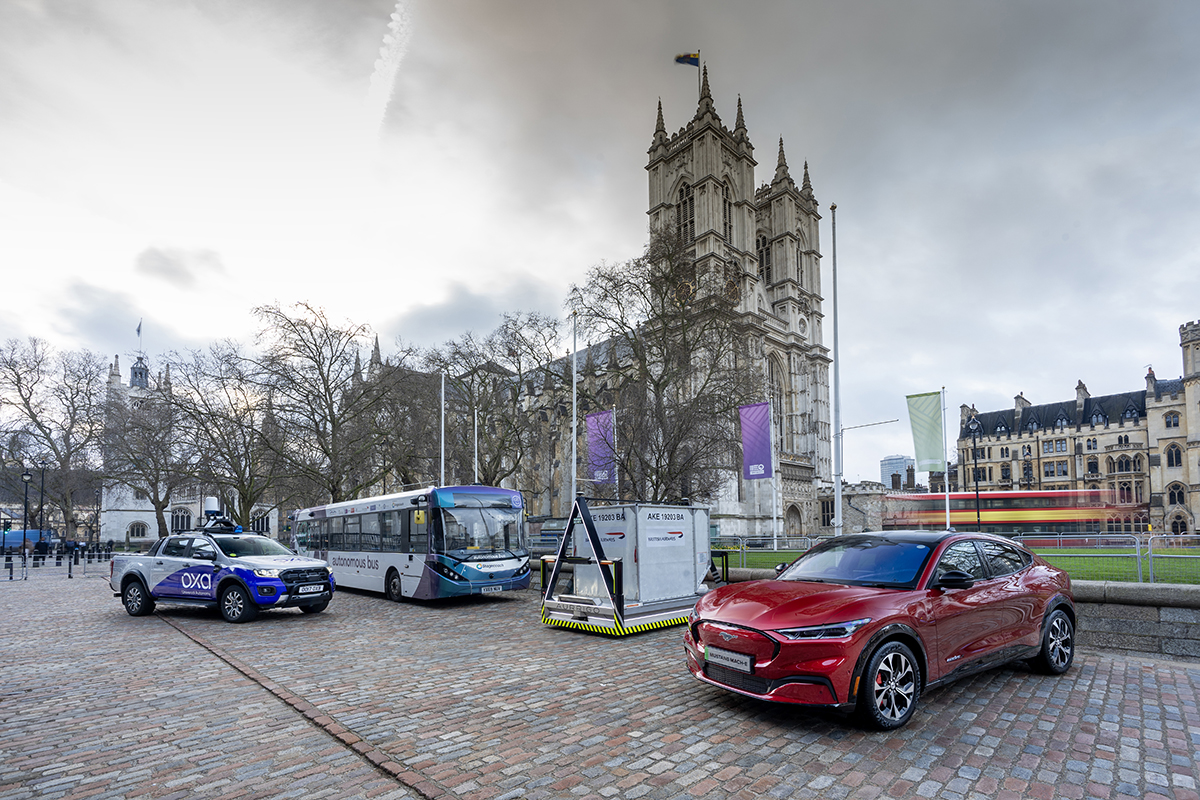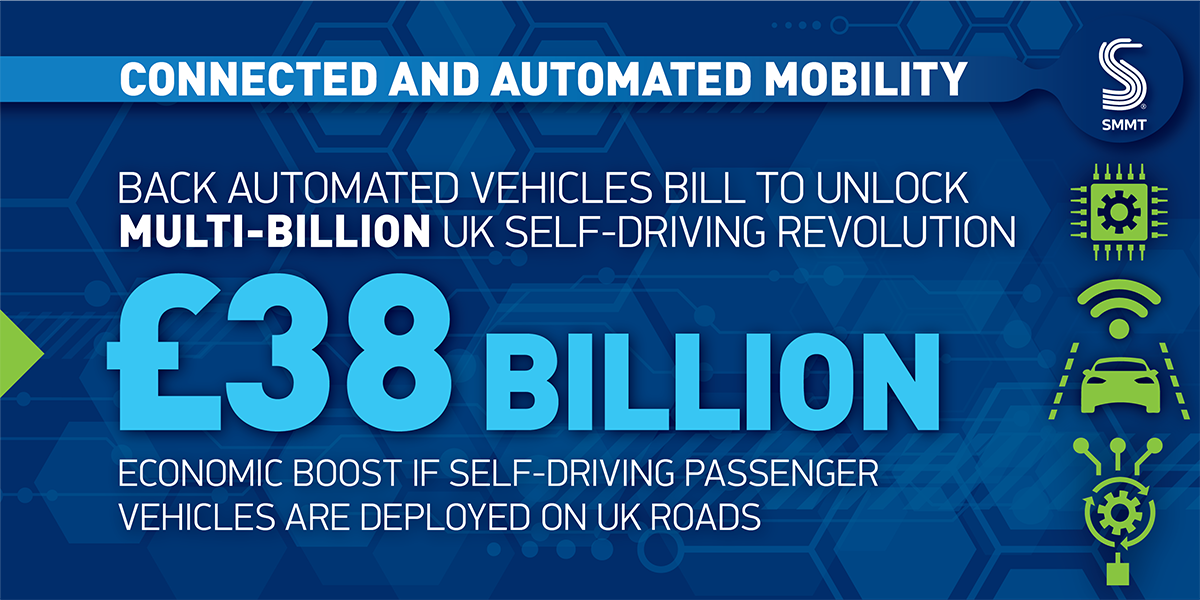- UK auto sector calls for swift passing of Automated Vehicles Bill to deliver long-term economic and social benefits.
- Technology could save an additional 3,200 lives and prevent 53,000 serious accidents by 2040, with £38 billion economic boost if self-driving passenger vehicles are deployed on UK roads.
- Stress free and safer driving, better rural availability, and potentially lower fares and cheaper insurance most popular reasons to try self-driving cars and public services, according to new poll.
- Nearly a third of all adults (29%) would use an automated passenger service today, with Gen Z even keener (44%) despite having never tried the cutting-edge tech.
The automotive sector is today urging all parliamentarians to back the Automated Vehicles (AV) Bill and ensure its swift passage into law so the UK can unlock the massive safety and economic benefits of self-driving passenger cars and public transport services. The tech, which reduces the risk of human error, could save an additional 3,200 lives and prevent 53,000 serious accidents, from now until 2040, with a £38 billion economic boost for the taking – but only if the AV Bill is enacted without delay.1
Even if the current timetable is met, following the Bill’s second reading in the House of Commons in early March, we are unlikely to see self-driving vehicles on British roads until at least 2026. But should the legislation be delayed until after the general election, that date is likely to be nearer to 2030, putting the UK at a significant disadvantage. Rival markets in the EU and US already have regulatory frameworks in place and have captured the lead, deploying the tech on public roads now – thus making the need for our own legislation even more urgent.
While the UK has firm foundations, thanks to government and industry jointly investing more than £600 million in self-driving vehicle trials since 2015, the risk is that the UK squanders its advantages. UK consumers are often more enthusiastic about new technology than many in Europe, with government research also revealing that public interest in self-driving technology increases once consumers learn more about it.2
Speaking today at SMMT Connected 2024, a major automotive event exploring the future of personal mobility and mass transport, Mike Hawes, SMMT Chief Executive, said,
Backing the AV Bill now is fundamental if Britain is to not only develop but deploy self-driving passenger cars and services. We have the foundations, but other major markets are stealing a march, with regulation already in place allowing them to benefit from UK-developed self-driving tech that cannot be rolled out here. Any further delay risks leaving Britain in the slow lane, jeopardising our competitiveness and holding back the significant safety and economic rewards self-driving technology can deliver.
Exclusive YouGov research commissioned by the Society of Motor Manufacturers and Traders (SMMT) found that nearly a third of adults (29%) would use an automated bus, shuttle or taxi service if available today, with one in four (26%) likely to try self-driving features in a personal car – even though they have yet to experience the technology.3
The poll also found that young people are even keener, with Generation Z (18-27 year-olds) almost twice (34%) as likely to try a personal car with self-driving features than Baby Boomers (18%) (60-78 year-olds).
Reduced stress of driving, safer journeys and potentially lower insurance costs were listed as the top three benefits of a self-driving car. For self-driving passenger services such as a bus, shuttle or taxi, consumers were most motivated by the prospect of lower fares, better availability in rural areas and safer journeys.

SMMT Connected vehicle display: Oxa Ford Ranger, Stagecoach autonomous bus AB1, Aurrigo Auto-Dolly, Ford Mustang Mach-E
Existing technologies such as Adaptive Cruise Control and Park Assist, the most popular Advanced Driver Assistance Systems (ADAS) among survey respondents, are already making our roads safer. Advanced Emergency Braking (AEB) technology, for example, is now available on eight-in-10 new cars and has led to a 38% reduction in real world rear-end crashes.4 With some nine-in-10 road collisions caused by driver error, the potential of new fully automated features to reduce the risk of accidents and casualties on Britain’s roads is self-evident.5
SMMT Connected 2024 is expected to welcome some 300 delegates from across the automotive and tech industries, government and other stakeholders to discuss challenges and opportunities in future mobility innovation and deployment. They will hear from speakers including the Rt Hon Mark Harper MP, Secretary of State for Transport; Dr. Celine Laurent-Winter, Vice President Connected Vehicle Platforms, BMW Group; and Prof. David Keene, Chief Executive, Aurrigo.
Notes to editors
1. Connected and Automated Mobility: The UK Economic and Market Opportunities – figures apply to only self-driving passenger cars and services.
2. The Great Self-Driving Exploration – A citizen view of self-driving technology in future transport systems.
3. All survey figures, unless otherwise stated, are from YouGov Plc. Total sample size was 2089 adults. Fieldwork was undertaken between 27th – 28th February 2024. The survey was carried out online. The figures have been weighted and are representative of all UK adults (aged 18+). YouGov is registered with the Information Commissioner and is a member of the British Polling Council.
4. JATO Dynamics data based on UK new car registrations for 2023 and Fildes, B. et al. (2015), “Effectiveness of low speed autonomous emergency braking in real-world rear-end crashes”, Accident Analysis & Prevention, 81: 24-9.
5. Self-driving buses, shuttles and delivery vans could soon hit UK roads thanks to £40 million government-funded competition









